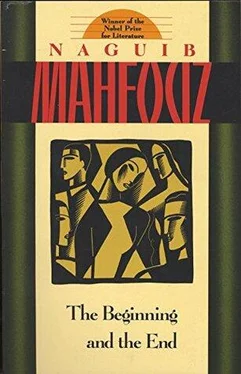Naguib Mahfouz - The Beginning and the End
Здесь есть возможность читать онлайн «Naguib Mahfouz - The Beginning and the End» весь текст электронной книги совершенно бесплатно (целиком полную версию без сокращений). В некоторых случаях можно слушать аудио, скачать через торрент в формате fb2 и присутствует краткое содержание. Год выпуска: 2016, Издательство: Anchor Books, Жанр: Классическая проза, на английском языке. Описание произведения, (предисловие) а так же отзывы посетителей доступны на портале библиотеки ЛибКат.
- Название:The Beginning and the End
- Автор:
- Издательство:Anchor Books
- Жанр:
- Год:2016
- ISBN:нет данных
- Рейтинг книги:4 / 5. Голосов: 1
-
Избранное:Добавить в избранное
- Отзывы:
-
Ваша оценка:
- 80
- 1
- 2
- 3
- 4
- 5
The Beginning and the End: краткое содержание, описание и аннотация
Предлагаем к чтению аннотацию, описание, краткое содержание или предисловие (зависит от того, что написал сам автор книги «The Beginning and the End»). Если вы не нашли необходимую информацию о книге — напишите в комментариях, мы постараемся отыскать её.
The Beginning and the End — читать онлайн бесплатно полную книгу (весь текст) целиком
Ниже представлен текст книги, разбитый по страницам. Система сохранения места последней прочитанной страницы, позволяет с удобством читать онлайн бесплатно книгу «The Beginning and the End», без необходимости каждый раз заново искать на чём Вы остановились. Поставьте закладку, и сможете в любой момент перейти на страницу, на которой закончили чтение.
Интервал:
Закладка:
His nostrils offended by the putrefying smell, he disgustedly climbed the spiral stairs, remembering with both annoyance and embarrassment his first visit to this house a year ago. Halting on the darkened threshold of his brother’s flat, he knocked. A strange man opened the door, one of the disfigured faces indelibly imprinted on his memory from his first visit. No sooner did he see Hassanein than the man slammed the door shut with a loud cry: “The Police!”
Surmising what had happened, ashamed, pained, and disturbed, Hassanein thought of withdrawing. But filled with an obstinate determination to carry out his objective at whatever cost, he stood his ground. To him, this was no insignificant question but a matter of life or death; he would be unable to make progress in the world as long as this house haunted him. He knocked on the door again and waited, realizing how useless it was. He knocked again, violently. Perhaps, he wondered, they might have escaped from the flat through one of the windows. Perhaps his brother would recognize his voice if he called his name aloud. But he was too ashamed to reveal his identity; to reassure his frightened companions, Hassan might tell them of their relationship — which Hassanein would rather bury forever. Yet how could he be sure that Hassan, to show off, had not already told someone or other who his brother was? As he gnashed his teeth, shame and despair made him all the more obstinate, and he violently hammered on the door with his fist, shouting, “Hassan, Hassan, it’s Hassanein!” Soon the door was opened. Appearing behind it, Hassan stared at him in amazement. As though recovering from shock, Hassan, motionless, fixed his eyes for a while upon him. Finally, he came alive, smiling. “Hassanein an officer!” he exclaimed. “I can’t believe my eyes!”
Pressing Hassanein’s hand with one of his and patting his arm with the other, he pulled him inside the flat with a loud, nervous laugh. Hassan walked by his side to the bedroom. “An officer! What a surprise! Congratulations! Congratulations! This is a happy day!”
Hassanein sat on the sofa. Hassan closed the door and sat by his side. Trying hard to overcome his confusion and excitement, the young officer smiled at his brother. “I deserve to be congratulated,” he said, “but you deserve to be thanked.”
Hassan laughed with pleasure, pleasure doubled by a sense of relief following the flurry. “Why should I deserve thanks?” he asked. “I’ve only given part of what’s due to you. But forget about that and tell me about our family. How are Mother and Nefisa? And how is Hussein?”
Pretending to be interested, Hassanein kept the conversation going. Their rambling talk brought Hassanein to the point of asking Hassan why he had stopped coming to see the family. But then he remembered that the ending of his brother’s visits afforded an unintended benefit; under the present circumstances, any continued relations would be most disastrous. Thus at the last moment he refrained from asking him.
“In fact,” Hassan said, “I miss the family very much. But my kind of life no longer allows me to satisfy my longing for them. True, we live in the same city. Yet I feel, indeed, that I’m the inhabitant of a remote place cut off from the rest of the world. Perhaps I worry less about them since I know that they no longer need my help and that I’ve performed part of my duty to them. Besides, I’m not always prosperous. Though my pockets may bulge with cash for several days, they soon become empty for several weeks. And when my pockets are full, I’m compelled to spend extravagantly whatever money I have. But never mind. Now that you’ve become an officer, I should congratulate you on your good fortune and keep my happiness for it pure. Congratulations to our respected officer!”
As he listened attentively to his brother, Hassanein studied his face. He was appalled at the disfigurement and the strange changes in it; it was as though Hassan in one year of his precarious life had gone through what would normally have been many years. Hassan had already stopped talking. Depressed and pessimistic, Hassanein realized the heavy weight of the task he had come to perform, but not for a moment did it occur to him to abandon what seemed to be his sense of duty. Determined to approach the purpose of his visit gently, he said, “I’m afraid my visit may have upset you.”
“Spit those words out of your mouth! What’s that I’m hearing from our respected officer?”
Pretending astonishment, Hassanein pointed to the exterior of the flat. “A strange man opened the door for me. Horrified, he cried, ‘The Police!’ and shut the door in my face!”
“An unfortunate misunderstanding,” Hassan said, laughing aloud. “But when I recognized your voice, everything ended up all right.”
Finding himself in difficulty, Hassanein hesitated before asking him, “But why was he so scared?”
Hassan looked at his brother inquisitively. Was he really ignorant or just playing the fool? “There are people, you know,” he replied indifferently, “who have a phobia about the police.”
“Isn’t it dangerous for you,” Hassanein asked, “to shelter such people under your roof?”
“Yes, it is,” Hassan said after a pause. “But a man isn’t free to choose his companions.”
“How is this, brother?” Hassanein inquired with astonishment. “Certainly a man is free to choose his companions!”
“Forget about it. Let’s change the subject.”
“I can’t, until I’m reassured about you.”
“Then be reassured and don’t worry about me,” Hassan answered with a laugh.
“I wonder what makes you befriend such evil people. You’re a respectable artist and you can choose your friends from your fellow artists.”
Hassan lowered his eyes to hide the grim look that appeared in them. He was infuriated, and had his anger been aroused by anyone other than Hassanein, he would have exploded. He was hurt that Hassanein knew more than he pretended to know about him and that he treated him like a child. Had Hassanein spoken his mind, had he described him as being as evil as his companions, he would not have felt angry as he did now. Determined to tear off the mask which concealed the true drift of their conversation, Hassan, still restraining his anger, spoke curtly in a tone different from before. “I’m one of these evil people!”
Hassanein was astounded.
“Hassanein! Stop pretending to be astonished,” Hassan said roughly. “You’re not a fool. Neither am I. You’d better speak to me as frankly as you always used to. What’s so strange about my being a black sheep? Haven’t I always been one, all my life?”
Sullen and ashamed, Hassanein lowered his eyes. His thoughts shattered, he fell speechless. Relieved by his brother’s confusion, Hassan’s merriment returned. Desiring to put an end to this painful conversation, he said, “Let’s forget about the whole thing. Damn the coward! But for his childish panic, our conversation wouldn’t have taken this foolish course. Now let’s discuss more important matters. I’ve no doubt,” he said, laughing, “that you’ve come to talk to me about a more important subject!”
Hassanein collected his thoughts. “I have, in fact,” he said with a sigh, “come only to discuss this matter with you.”
Hassan’s face clouded with resentment. “I thought,” he said ironically, “you’d come to ask for money.”
Although he knew how angry his brother was, Hassanein did not waver. Ingratiating himself with his brother, he said gently, “Thank you for your previous kindness. But I’m no longer in need of money. I’ve come to discuss a matter much more serious than money. I want to reassure myself about you.”
Hassan cast a piercing look at his brother. “I still demand that you be more frank with me!” he said in an ironical tone. “My respected officer, you want to get reassured about yourself and not about me!”
Читать дальшеИнтервал:
Закладка:
Похожие книги на «The Beginning and the End»
Представляем Вашему вниманию похожие книги на «The Beginning and the End» списком для выбора. Мы отобрали схожую по названию и смыслу литературу в надежде предоставить читателям больше вариантов отыскать новые, интересные, ещё непрочитанные произведения.
Обсуждение, отзывы о книге «The Beginning and the End» и просто собственные мнения читателей. Оставьте ваши комментарии, напишите, что Вы думаете о произведении, его смысле или главных героях. Укажите что конкретно понравилось, а что нет, и почему Вы так считаете.












